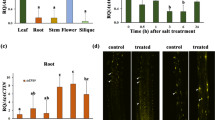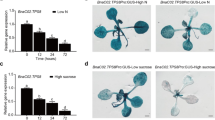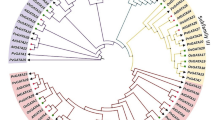Abstract
Plant aquaporins (AQPs) are subdivided into eight groups: PIPs, NIPs, GIPs, HIPs, XIPs, LIPs, TIPs, and SIPs. However, the genetic function and physiological mechanisms of the SIP group in abiotic stress response in plants remains unknown. In this study, we cloned and characterized a banana SIP group AQP gene, designated MaSIP2-1. MaSIP2-1 showed upregulation after osmotic, salt, and cold treatments. Overexpression of MaSIP2-1 in bananas resulted in smaller leaf area and lower plant height than wild-type (WT) plants under normal growth conditions. Lines over-expressing MaSIP2-1 showed increased tolerance to drought and cold stresses, demonstrating that transgenic lines had higher content of chlorophyll, proline, soluble sugar, and abscisic acid (ABA), but lower levels of ion leakage (IL), malondialdehyde (MDA), H2O2, and gibberellins (GAs), than WT after drought, cold, and recovery conditions. Moreover, transgenic lines had higher expression of ABA biosynthetic and responsive genes than WT under drought and cold conditions. Taken together, our results show that MaSIP2-1 plays a positive role in dwarfing and tolerance to drought and cold stresses through improved osmotic adjustment, less membrane injury, and changes in ABA and GA levels. Therefore, MaSIP2-1 has the potential for utilization to improve abiotic stress tolerance in crop breeding.








Similar content being viewed by others
References
Aharon R, Shahak Y, Wininger S, Bendov R, Kapulnik Y, Galili G (2003) Overexpression of a plasma membrane aquaporin in transgenic tobacco improves plant vigor under favorable growth conditions but not under drought or salt stress. Plant Cell 15:439–447. https://doi.org/10.1105/tpc.009225
Bates LS, Waldren RP, Teare ID (1973) Rapid determination of free proline for water-stress studies. Plant Soil 39:205–207. https://doi.org/10.1007/bf00018060
Ben-Ari G (2012) The ABA signal transduction mechanism in commercial crops: learning from Arabidopsis. Plant Cell Rep 31:1357–1369. https://doi.org/10.1007/s00299-012-1292-2
Chaumont F, Barrieu F, Wojcik E, Chrispeels MJ, Jung R (2001) Aquaporins constitute a large and highly divergent protein family in maize. Plant Physiol 125:1206–1215. https://doi.org/10.1104/pp.125.3.1206
El-Esawi AM, Al-Ghamdi AA, Ali MH, Ahmad M (2019) Overexpression of AtWRKY30 Transcription Factor Enhances Heat and Drought Stress Tolerance in Wheat (Triticum aestivum L.). Genes 10:163. https://doi.org/10.3390/genes10020163
Feng ZJ, Liu N, Zhang GW, Niu FG, Xu SC, Gong YM (2019) Investigation of the AQP family in soybean and the promoter activity of TIP2;6 in heat stress and hormone responses. Int J Mol Sci 20. https://doi.org/10.3390/ijms20020262
Feng ZJ, Xu SC, Liu N, Zhang GW, Hu QZ, Xu ZS, Gong YM (2018) Identification of the AQP members involved in abiotic stress responses from Arabidopsis. Gene 646:64–73. https://doi.org/10.1016/j.gene.2017.12.048
Gu X, Gao Z, Yan Y, Wang X, Qiao Y, Chen Y (2017) RdreB1BI enhances drought tolerance by activating AQP-related genes in transgenic strawberry. Plant Physiol Biochem 119:33–42. https://doi.org/10.1016/j.plaphy.2017.08.013
Guo L, Wang ZY, Lin H, Cui WE, Chen J, Liu M, Chen ZL, Qu LJ, Gu H (2006) Expression and functional analysis of the rice plasma-membrane intrinsic protein gene family. Cell Res 16:277–286. https://doi.org/10.1038/sj.cr.7310035
Heath RL, Packer L (1968) Steady-state fluorescence of spinach chloroplasts and electron flow. Arch Biochem Biophys 125:1019–1022. https://doi.org/10.1016/0003-9861(68)90541-9
Hu W, Hou X, Huang C, Yan Y, Tie W, Ding Z, Wei Y, Liu J, Miao H, Lu Z, Li M, Xu B, Jin Z (2015) Genome-wide identification and expression analyses of aquaporin gene family during development and abiotic stress in banana. Int J Mol Sci 16:19728–19751. https://doi.org/10.3390/ijms160819728
Hu W, Yan Y, Shi H, Liu J, Miao H, Tie W, Ding Z, Ding X, Wu C, Liu Y, Wang J, Xu B, Jin Z (2017) The core regulatory network of the abscisic acid pathway in banana: genome-wide identification and expression analyses during development, ripening, and abiotic stress. BMC Plant Biol 17:145. https://doi.org/10.1186/s12870-017-1093-4
Hu W, Yuan Q, Wang Y, Cai R, Deng X, Wang J, Zhou S, Chen M, Chen L, Huang C, Ma Z, Yang G, He G (2012) Overexpression of a wheat aquaporin gene, TaAQP8, enhances salt stress tolerance in transgenic tobacco. Plant Cell Physiol 53:2127–2141. https://doi.org/10.1093/pcp/pcs154
Hussain A, Tanveer R, Mustafa G, Farooq M, Amin I, Mansoor S (2020) Comparative phylogenetic analysis of aquaporins provides insight into the gene family expansion and evolution in plants and their role in drought tolerant and susceptible chickpea cultivars. Genomics 112:263–275. https://doi.org/10.1016/j.ygeno.2019.02.005
Jang JY, Lee SH, Rhee JY, Chung GC, Ahn SJ, Kang H (2007) Transgenic Arabidopsis and tobacco plants overexpressing an aquaporin respond differently to various abiotic stresses. Plant Mol Biol 64:621–632. https://doi.org/10.1007/s11103-007-9181-8
Javot H, Lauvergeat V, Santoni V, Martin-Laurent F, Guclu J, Vinh J, Heyes J, Franck KI, Schaffner AR, Bouchez D, Maurel C (2003) Role of a single aquaporin isoform in root water uptake. Plant Cell 15:509–522. https://doi.org/10.1105/tpc.008888
Jiang M, Zhang J (2001) Effect of abscisic acid on active oxygen species, antioxidative defence system and oxidative damage in leaves of maize seedlings. Plant Cell Physiol 42:1265–1273. https://doi.org/10.1093/pcp/pce162
Johanson U, Karlsson M, Johansson I, Gustavsson S, Sjovall S, Fraysse L, Weig AR, Kjellbom P (2001) The complete set of genes encoding major intrinsic proteins in Arabidopsis provides a framework for a new nomenclature for major intrinsic proteins in plants. Plant Physiol 126:1358–1369. https://doi.org/10.1104/pp.126.4.1358
Kaldenhoff R, Grote K, Zhu JJ, Zimmermann U (1998) Significance of plasmalemma aquaporins for water-transport in Arabidopsis thaliana. Plant J 14:121–128
Kanno Y, Oikawa T, Chiba Y, Ishimaru Y, Shimizu T, Sano N, Koshiba T, Kamiya Y, Ueda M, Seo M (2016) AtSWEET13 and AtSWEET14 regulate gibberellin-mediated physiological processes. Nat Commun 7:13245. https://doi.org/10.1038/ncomms13245
Kapilan R, Vaziri M, Zwiazek JJ (2018) Regulation of aquaporins in plants under stress. Biol Res 51:4. https://doi.org/10.1186/s40659-018-0152-0
Li GW, Zhang MH, Cai WM, Sun WN, Su WA (2008) Characterization of OsPIP2;7, a water channel protein in rice. Plant Cell Physiol 49:1851–1858. https://doi.org/10.1093/pcp/pcn166
Li W, Zhang D, Zhu G, Mi X, Guo W (2019) Combining genome-wide and transcriptome-wide analyses reveal the evolutionary conservation and functional diversity of aquaporins in cotton. BMC Genomics 20:538. https://doi.org/10.1186/s12864-019-5928-2
Lian HL, Yu X, Ye Q, Ding X, Kitagawa Y, Kwak SS, Su WA, Tang ZC (2004) The role of aquaporin RWC3 in drought avoidance in rice. Plant Cell Physiol 45:481–489. https://doi.org/10.1093/pcp/pch058
Lin Q, Wu F, Sheng P, Zhang Z, Zhang X, Guo X, Wang J, Cheng Z, Wang H, Wan J (2015) The SnRK2-APC/C(TE) regulatory module mediates the antagonistic action of gibberellic acid and abscisic acid pathways. Nat Commun 6:7981. https://doi.org/10.1038/ncomms8981
Liu J, Gao P, Sun X, Zhang J, Sun P, Wang J, Jia C, Zhang J, Hu W, Xu B, Jin Z (2017) Efficient regeneration and genetic transformation platform applicable to five Musa varieties. Electronic Journal of Biotechnology 25:33–38. https://doi.org/10.1016/j.ejbt.2016.11.002
Liu J, Zhu JK (1997) Proline accumulation and salt-stress-induced gene expression in a salt-hypersensitive mutant of Arabidopsis. Plant Physiol 114:591–596. https://doi.org/10.1104/pp.114.2.591
Livak KJ, Schmittgen TD (2001) Analysis of relative gene expression data using real-time quantitative PCR and the 2(-Delta Delta C(T)) Method. Methods 25:402–408. https://doi.org/10.1006/meth.2001.1262
Madrid-Espinoza J, Brunel-Saldias N, Guerra PF, Gutiérrez A, Del Pozo A (2018) Genome-Wide Identification and Transcriptional Regulation of Aquaporin Genes in Bread Wheat (Triticum aestivum L.) under Water Stress. Genes 9:497. https://doi.org/10.3390/genes9100497
Mittler R, Vanderauwera S, Gollery M, Van Breusegem F (2004) Reactive oxygen gene network of plants. Trends Plant Sci 9:490–498. https://doi.org/10.1016/j.tplants.2004.08.009
Moore K, Roberts LJ (1998) Measurement of lipid peroxidation. Free Radic Res 28:659–671
Plaza-Wuthrich S, Blosch R, Rindisbacher A, Cannarozzi G, Tadele Z (2016) Gibberellin deficiency confers both lodging and drought tolerance in small cereals. Front Plant Sci 7:643. https://doi.org/10.3389/fpls.2016.00643
Reuscher S, Akiyama M, Mori C, Aoki K, Shibata D, Shiratake K (2013) Genome-wide identification and expression analysis of aquaporins in tomato. PLoS One 8:e79052. https://doi.org/10.1371/journal.pone.0079052
Sakurai J, Ishikawa F, Yamaguchi T, Uemura M, Maeshima M (2005) Identification of 33 rice aquaporin genes and analysis of their expression and function. Plant Cell Physiol 46:1568–1577. https://doi.org/10.1093/pcp/pci172
Sreedharan S, Shekhawat UK, Ganapathi TR (2013) Transgenic banana plants overexpressing a native plasma membrane aquaporin MusaPIP1;2 display high tolerance levels to different abiotic stresses. Plant Biotechnol J 11:942–952. https://doi.org/10.1111/pbi.12086
Sreedharan S, Shekhawat UKS, Ganapathi TR (2015) Constitutive and stress-inducible overexpression of a native aquaporin gene (MusaPIP2;6) in transgenic banana plants signals its pivotal role in salt tolerance. Plant Mol Biol 88:41–52. https://doi.org/10.1007/s11103-015-0305-2
Tao P, Zhong X, Li B, Wang W, Yue Z, Lei J, Guo W, Huang X (2014) Genome-wide identification and characterization of aquaporin genes (AQPs) in Chinese cabbage (Brassica rapa ssp. pekinensis). Mol Genet Genomics 289:1131–1145. https://doi.org/10.1007/s00438-014-0874-9
Umezawa T, Nakashima K, Miyakawa T, Kuromori T, Tanokura M, Shinozaki K, Yamaguchi-Shinozaki K (2010) Molecular basis of the core regulatory network in ABA responses: sensing, signaling and transport. Plant Cell Physiol 51:1821–1839. https://doi.org/10.1093/pcp/pcq156
van Asten PJA, Fermont AM, Taulya G (2011) Drought is a major yield loss factor for rainfed East African highland banana. Agric Water Manage 98:541–552. https://doi.org/10.1016/j.agwat.2010.10.005
Wang X, Gao F, Bing J, Sun W, Feng X, Ma X, Zhou Y, Zhang G (2019) Overexpression of the Jojoba Aquaporin Gene, ScPIP1, Enhances Drought and Salt Tolerance in Transgenic Arabidopsis. Int J Mol Sci 20:153. https://doi.org/10.3390/ijms20010153
Xu Y, Hu W, Liu J, Zhang J, Jia C, Miao H, Xu B, Jin Z (2014) A banana aquaporin gene, MaPIP1;1, is involved in tolerance to drought and salt stresses. BMC Plant Biol 14:59. https://doi.org/10.1186/1471-2229-14-59
Zhang S, Feng M, Chen W, Zhou X, Lu J, Wang Y, Li Y, Jiang CZ, Gan SS, Ma N, Gao J (2019) In rose, transcription factor PTM balances growth and drought survival via PIP2;1 aquaporin. Nat Plants 5:290–299. https://doi.org/10.1038/s41477-019-0376-1
Zhou S, Hu W, Deng X, Ma Z, Chen L, Huang C, Wang C, Wang J, He Y, Yang G, He G (2012) Overexpression of the wheat aquaporin gene, TaAQP7, enhances drought tolerance in transgenic tobacco. PLoS One 7:e52439. https://doi.org/10.1371/journal.pone.0052439
Zhu D, Wu Z, Cao G, Li J, Wei J, Tsuge T, Gu H, Aoyama T, Qu LJ (2014) TRANSLUCENT GREEN, an ERF family transcription factor, controls water balance in Arabidopsis by activating the expression of aquaporin genes. Mol Plant 7:601–615. https://doi.org/10.1093/mp/sst152
Funding
This research was funded by the Natural Science Foundation of Hainan Province (2019CXTD412), the National Natural Science Foundation of China (31501371), the Central Public-interest Scientific Institution Basal Research Fund for Chinese Academy of Tropical Agricultural Sciences (1630092020002, 1630052017018, 1630052019024, 1630052016005, 1630052016006 and 1630092020006) and the earmarked fund for China Agriculture Research System (CARS-31-01 and CARS-31-02).
Author information
Authors and Affiliations
Contributions
Conceptualization, B.X. and Z.J..; methodology, Y.X.; software, Y.X. and W.H.; validation, A.W. and D.H.; formal analysis, Z.X., D.F. Z. and Y.L.; investigation, Y.X., W.H., S.S., X.H., J.W., J.Y.L. and J.L.; resources, B.X. and Z.J.; data curation, Y.X. and W.H.; writing—original draft preparation, W.H. and Y.X.; writing—review and editing, W.H., B.X. and Z.J.; visualization, Y.X. and W.H.; supervision, B.X. and Z.J.; project administration, W.H., B.X. and Z.J.; funding acquisition, Y.X., B.X. and Z.J. All authors have read and agreed to the published version of the manuscript.
Corresponding authors
Ethics declarations
Conflict of Interest
The authors declare that they have no conflict of interest.
Additional information
Publisher’s note
Springer Nature remains neutral with regard to jurisdictional claims in published maps and institutional affiliations.
Electronic supplementary material
ESM 1
(PDF 1100 kb)
Rights and permissions
About this article
Cite this article
Xu, Y., Li, J., Song, S. et al. A novel aquaporin gene MaSIP2-1 confers tolerance to drought and cold stresses in transgenic banana. Mol Breeding 40, 62 (2020). https://doi.org/10.1007/s11032-020-01143-7
Received:
Accepted:
Published:
DOI: https://doi.org/10.1007/s11032-020-01143-7




